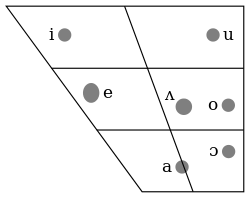Ibibio language
Ibibio (proper) is the native language of the Ibibio people of Akwa Ibom State, Nigeria, belonging to the Ibibio-Efik dialect cluster of the Cross River languages. The name Ibibio is sometimes used for the entire dialect cluster. In pre-colonial times, it was written with Nsibidi ideograms, similar to Igbo, Efik, Anaang, and Ejagham. Ibibio has also had influences on Afro-American diasporic languages such as AAVE words like buckra, and buckaroo, which come from the Ibibio word mbakara, and in the Afro-Cuban tradition of abakua.
| Ibibio | |
|---|---|
| (Ibibio proper) | |
| Native to | Southern Nigeria |
| Region | Akwa Ibom State |
| Ethnicity | Ibibio |
Native speakers | 1.5 to 2 million (1998)[1] |
| Language codes | |
| ISO 639-3 | ibb |
| Glottolog | ibib1240[2] |
| Ibibio language test of Wikipedia at Wikimedia Incubator |
Phonology
Consonants
| Labial | Coronal | Palatal | Velar | Labial-velar | ||
|---|---|---|---|---|---|---|
| Nasal | m | n | ɲ | ŋ | ||
| Plosive | voiceless | b | t | k | k͡p | |
| voiced | d | |||||
| Fricative | voiceless | f | s | |||
| Approximant | j | w | ||||
Vowels

| Front | Back | ||
|---|---|---|---|
| unrounded | unrounded | rounded | |
| Close | i | u | |
| Mid | e | ʌ | o |
| Open | a | ɔ | |
- /i, u/ are phonetically near-close [ɪ, ʊ].[3]
- /e, ʌ, o/ are phonetically true-mid; /ʌ/ is also strongly centralized: [e̞, ʌ̝̈, o̞].[3]
- /a, ɔ/ are phonetically near-open; /a/ is central rather than front: [ɐ, ɔ̞].[3]
Between consonants, /i, u, o/ have allophones that are transcribed [ɪ, ʉ, ə], respectively.[3] At least in case of [ɪ, ə], the realization is probably somewhat different (e.g. close-mid [e, ɘ]), because the default IPA values of the symbols [ɪ, ə] are very similar to the normal realizations of the Ibibio vowels /i, ʌ/. Similarly, [ʉ] may actually be near-close [ʉ̞], rather than close [ʉ].
In some dialects (e.g. Ibiono), /ɪ, ʉ, ə/ occur as phonemes distinct from /i, u, o/.[3]
Tones
Ibibio has two tones: high and low. A word can be used to mean two or more different things based on the tone ascribed to it.[5]
References
- Ibibio at Ethnologue (15th ed., 2005)
- Hammarström, Harald; Forkel, Robert; Haspelmath, Martin, eds. (2017). "Ibibio". Glottolog 3.0. Jena, Germany: Max Planck Institute for the Science of Human History.
- Urua (2004), p. 106.
- Urua (2004), pp. 105–106.
- Urua (2004), p. 107.
Bibliography
- Urua, Eno-Abasi E. (2004), "Ibibio", Journal of the International Phonetic Association, 34 (1): 105–109, doi:10.1017/S0025100304001550
Further reading
- Bachmann, Arne (2006): "Ein quantitatives Tonmodell für Ibibio. Entwicklung eines Prädiktionsmoduls für das BOSS-Sprachsynthesesystem." Magisterarbeit, University of Bonn.
- Kaufman, Elaine Marlowe (1972) Ibibio dictionary. Leiden: African Studies Centre / Cross River State University / Ibibio Language Board. ISBN 90-70110-46-6
External links
- Ibibio kasahorow – language resources, including dictionary, books and proverbs.
- Bachmann's Master Thesis, Paper, Presentation
- BOSS-IBB documentation v0.1-r4
- ELAR Documentation of Dirge songs among the Urban people [Efik, Ibibio]
- ELAR Documentation of documenting drums and drum language in Ibibio traditional ceremonies